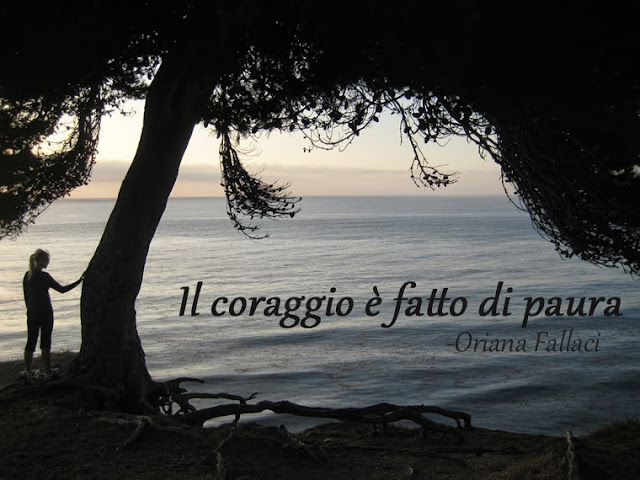"Il coraggio è fatto di paura" (Courage is made of fear.) As somebody who interviewed top world leaders during the 60s, 70s and 80s, including Ayatollah Khomeini in 1979 & North Vietnamese General Vo Nguyen Giap during the Vietnam War, Italian journalist Oriana Fallaci, might know a thing or two about courage and fear.
The idea of courage and fear coexisting and even going hand in hand might not be a new one, but it has enjoyed more popularity lately thanks to the work of Dr. Brené Brown, who first came into the spotlight for her TEDx talk on vulnerability*, and her appearances on Oprah's Super Soul Sunday, and Lifeclass. One of the central points of her research is the idea that vulnerability is not weakness, but rather being authentic and willing to stand up and be seen, and in order to be vulnerable, one must be courageous. Being courageous does not require eliminating fear...the truly courageous still experience fear, but they know how to embrace it and use it to their advantage while staying true to their values.
{*Thanks to TED.com's subtitle feature, you can listen to your favorite TED talks in English while reading the translation in several languages. It's a good way to see how different terms and expressions are worded in Italian, and can be a good way to recognize and memorize new vocabulary. The Italian transcription & subtitles are available for Brené Brown's talk... give it a try! Just choose Italian from the dropdown menu labeled "42 languages [Off]" that appears when you scroll over the bottom portion of the video}
I wondered if the concept of courage was viewed the same between Italian and American/English culture, so I looked to dictionaries for clues....
I thought it was interesting that the Italian definition translated to "strength of spirit" while the English definition focused on some of the negative situations that might require courage. I personally respond more to the Italian version, and wonder if defining it in more positive terms also helps one to embrace it more fully, with all its parts- bravery & fear, conviction & doubt, etc.
coraggio: 1. Forza d’animo:
WordReference.com - Dizionario della Lingua Italiana © 2012 Le Monnier
courage: 1. the power or quality of dealing with or facing danger, fear, pain, etc
I thought it was interesting that the Italian definition translated to "strength of spirit" while the English definition focused on some of the negative situations that might require courage. I personally respond more to the Italian version, and wonder if defining it in more positive terms also helps one to embrace it more fully, with all its parts- bravery & fear, conviction & doubt, etc.
What do you think? Che ne pensi?
Some of my favorite vocabulary from the transcription/translation of Brené Brown's talk:
il coraggio - courage
{comes from Latin "cor" for heart, which remains a common metaphor for inner strength} courtesy of etymonline.com
la paura - fear
la vulnerabilità - vulnerability
fare la sviolinata a qualcuno - to sweet talk somebody
la connessione - connection
il senso di appartenenza - sense of belonging
la vergogna - shame
immedesimarsi - to empathize; put oneself in another's shoes, identify with
un senso di merito - a sense of worth
compassionevole - compassionate
l'autenticità - authenticity
un risveglio spirituale - a spiritual awakening
le balle - B.S. (bull-sh..)
abbastanza - enough
appassionatamente - passionately
Happy Studying!
-Alex








+by+Alex+for+didattichiamo.blogspot.jpg)




